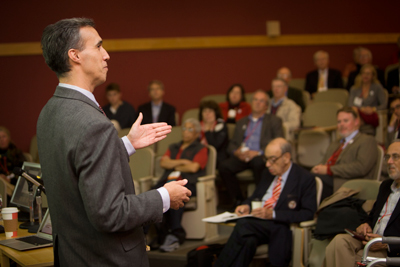Cornell, a 'tech powerhouse,' is prepared to spur economic development, tech transfer in NYC
By Anne Ju

Cornell's proven leadership in technology fields, its breadth of interdisciplinary research and its established track record of alumni entrepreneurship all make the case for a Cornell tech campus in New York City, Dan Huttenlocher told a packed room during Trustee-Council Weekend.
The dean of computing and information science and leader in the Cornell New York City Tech Campus initiative, Huttenlocher told trustees and alumni during his Oct. 21 academic presentation that Cornell's proposal, just a week away from submission, makes a strong case for the futures of both Cornell and New York.
"We're just the best ones to unleash this development in New York City," Huttenlocher said. "Why? We are a tech powerhouse, absolutely, hands down."
What's more, Cornell attracts the best faculty and students in the world. That, Huttenlocher said, coupled with already strong ties to New York City, will be critical to driving the economic development Mayor Michael Bloomberg is seeking through the tech campus, for which he has engaged several institutions in an open Request for Proposals process.
Cornell's technology leadership is evident through its history, Huttenlocher said. Its pioneering electrical engineering department was established in 1883. A department of computer science, then a nascent field, was created in 1965. And most recently, a cross-college unit called Computing and Information Science (CIS) came on in 1999, helping to shape the information revolution by recognizing that technology and computing touch every academic discipline.
This history, along with recent pushes toward technology entrepreneurship within CIS and engineering, is now meeting what Huttenlocher called the "perfect platform" to keep on this path -- Bloomberg's vision to create a buzzing technology campus in Manhattan.
New York is the center of global commerce, fashion, media and many other industries, Huttenlocher said, but it is not traditionally known as a high-tech leader the way other cities are. Its technology ecosystem, he said, is like an adolescent -- fledgling and strong but needing guidance with such things as seasoned managers, serial entrepreneurs and an infusion of technology talent. And Cornell is best poised to lead the way.
In recent days, Cornell announced it would build the tech campus in partnership with The Technion -- Israel Institute of Technology, Huttenlocher said. Among its offerings will be a master's degree program in applied science through the Technion-Cornell Innovation Institute.
The opportunity to design a completely new kind of campus and academic programming on a "clean slate," Huttenlocher said, has been an "amazing" experience. He explained how the campus, to focus on economic development and rapid entrepreneurship, would be organized into academic research "hubs" rather than traditional departments and disciplines.
One of the hubs being proposed is called Connective Media -- it recognizes and builds on how information is shared across many user platforms. Another is Healthier Life -- it could improve not just health, but health care habits and choices, as well as the technology that supports health care providers, insurance and government agencies.
The timeline for the proposal has been a rapid one, Huttenlocher said. By the end of December, the city will have made its choice. Cornell is proposing to start immediately, with student programs in the city to open by next fall. A campus, most likely on Roosevelt Island, would be slated to open by 2017.
Media Contact
Get Cornell news delivered right to your inbox.
Subscribe